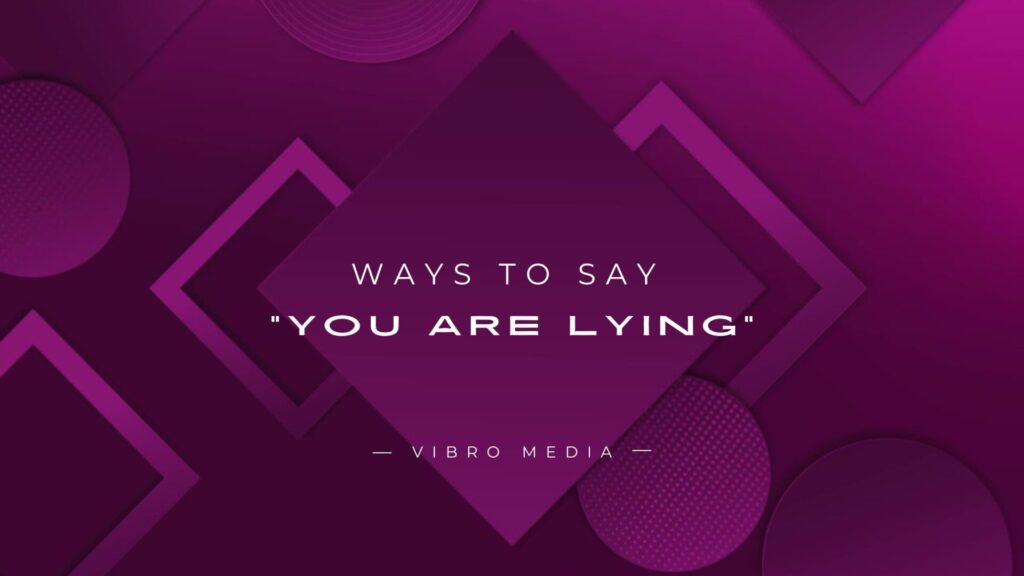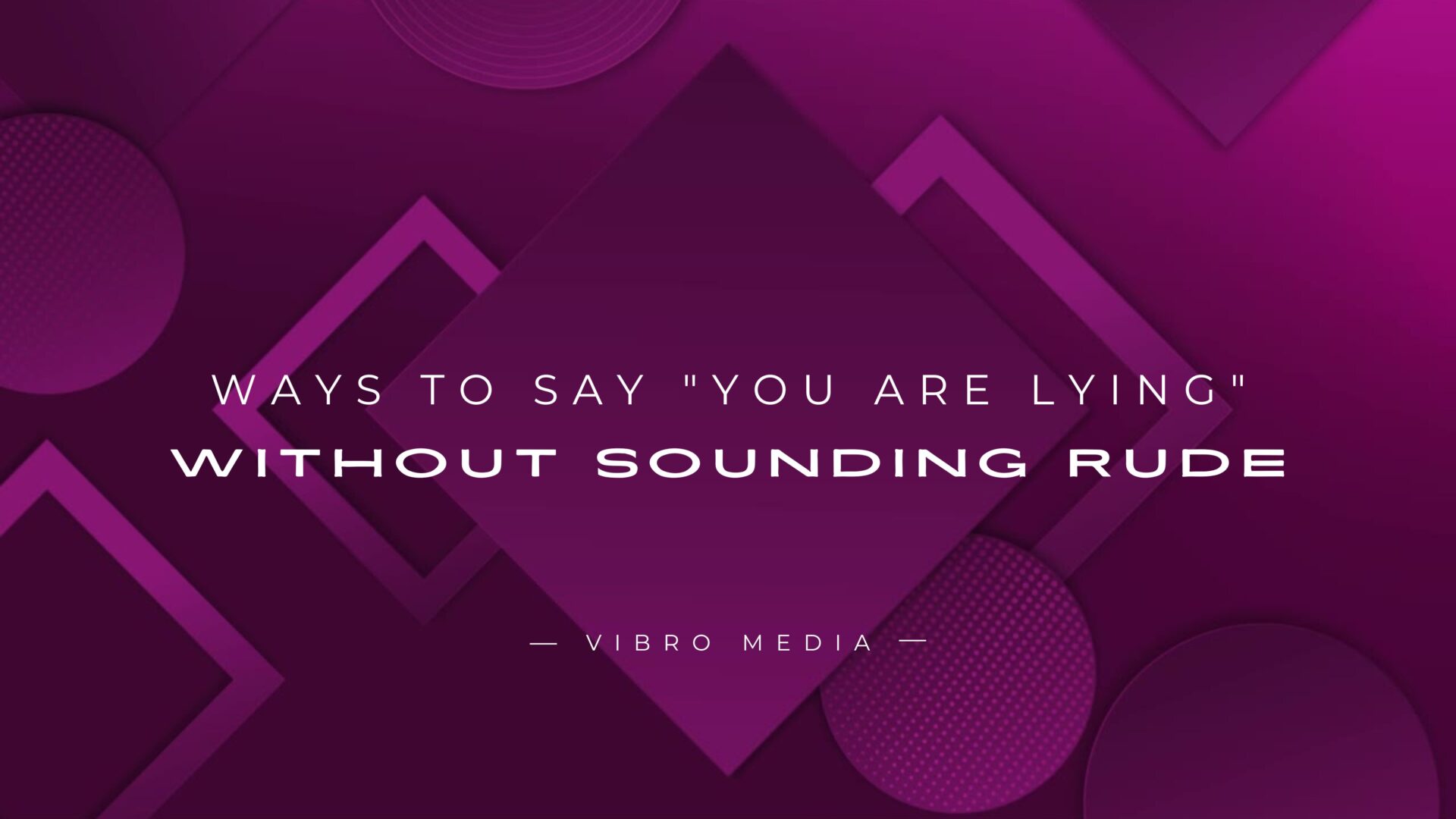Lying is part of human nature, but that doesn’t mean it’s easy to deal with. Whether facing a small white lie or something more significant, knowing how to respond without escalating the situation can be challenging. This article will guide you through various ways to say, “You are lying,” and how to handle dishonesty with tact, humour, or directness. Confronting a lie can take many forms, from professional settings to personal relationships. Let’s dive into how to do this effectively while keeping relationships intact.

200+ Ways to Say “You Are Lying”
Direct Accusations
- You’re not being truthful.
- That’s a blatant lie.
- You’re not being honest.
- You’re fabricating that story.
- You’re lying through your teeth.
- What you’re saying is simply untrue.
- That’s a falsehood.
- You’re misrepresenting the facts.
- You’re trying to deceive me.
- You’re not speaking the truth.
Implying Dishonesty
- I have my doubts about what you’re saying.
- Your version of events doesn’t seem credible.
- Something feels off about your story.
- I’m sceptical of your claims.
- It sounds like you’re not being forthcoming.
- I sense some dishonesty in your words.
- That doesn’t quite add up.
- Your explanation seems shady.
- It’s hard to take that at face value.
- Your narrative raises some red flags.
Humorous Approaches
- Are you sure you’re not auditioning for a role?
- That’s quite the fairy tale you’ve got there!
- Did you take a creative writing class?
- Sounds like you’ve been reading too many novels!
- Is this a script for a soap opera?
- I didn’t know we were in a comedy show!
- That’s a story worthy of a blockbuster!
- Did your imagination run wild again?
- You should join a storytelling club!
- That sounds like a plot twist in a movie!
Sarcastic Remarks
- Oh, I believe every word!
- Sure, and I’m a superhero!
- That’s a believable story, isn’t it?
- Right, and unicorns are real, too!
- Wow, what a surprising revelation!
- I can see you’ve got your facts straight!
- Do you expect me to swallow that?
- That’s as credible as a magic trick!
- Sounds legit, like a fairytale!
- Ah yes, the truth according to you!
Questioning Integrity
- Why would you say something so misleading?
- What makes you think I would believe that?
- Is there a reason you’re not being honest?
- What’s the real story here?
- Are you sure that’s how it happened?
- Do you think I’ll just take your word for it?
- Why would you distort the truth?
- What’s motivating you to lie?
- Can you justify that statement?
- What are you trying to hide?
Subtle Suggestions
- Are you sure you’re being honest with me?
- Is that the full picture?
- Could there be more to this story?
- Have you considered how that sounds?
- Is there something you’re not telling me?
- What do you mean by that?
- What if that’s not entirely true?
- Do you believe that?
- Have you thought about its implications?
- Perhaps there’s another side to this?
Expressing Skepticism
- I find that hard to believe.
- That sounds far-fetched.
- I’m not sure about your accuracy.
- That seems too convenient.
- Your story raises my eyebrows.
- I’m doubtful about what you just said.
- It’s difficult to take that seriously.
- You expect me to accept that?
- That doesn’t sound reliable.
- I have a hard time trusting that claim.
Using Body Language or Non-verbal Cues
- (Raising eyebrows) Really?
- (Shaking head) I can’t accept that.
- (Crossing arms) That doesn’t sit well with me.
- (Furrowing brow) Are you serious right now?
- (Pointing finger) I don’t think so!
- (Sighing) That’s hard to swallow.
- (Smirking) Is that your best shot?
- (Rolling eyes) Please, give me a break!
- (Nodding slowly) Uh-huh, sure…
- (Looking sceptical) Do you believe that?
Using Analogies or Metaphors
- That’s like saying the sky is green.
- You’re spinning a yarn, aren’t you?
- That’s as believable as a fish flying.
- You’re painting a pretty picture, but it’s not real.
- That sounds like a fairy tale to me.
- You’re pulling my leg, right?
- That’s a story as old as time.
- You’re serving up a tall tale!
- That’s like trying to fit a square peg in a round hole.
- You’re not fooling anyone with that story.
Confrontational Approaches
- Stop lying to me.
- Cut the nonsense.
- Don’t try to fool me.
- Enough with the games!
- I know when I’m being lied to.
- You can’t expect me to buy that.
- I see right through your lies.
- Don’t insult my intelligence.
- You’re not being honest.
- Let’s cut to the chase: you’re lying.
Formal or Polite Expressions
- I find your statement questionable.
- I’m struggling to accept your account.
- There are inconsistencies in what you said.
- Your assertion requires further verification.
- I would appreciate more clarity on this matter.
- There may be some inaccuracies in your claims.
- I have reservations about your explanation.
- Please elaborate on your statement.
- I would like to discuss the validity of your claims.
- Your narrative seems less than truthful.
Cultural References
- That sounds like a plot twist from a movie.
- You’re giving me major ‘Game of Thrones’ vibes!
- Did you just come out of a ‘Twilight Zone’ episode?
- That’s as believable as a superhero story.
- Sounds like something out of a Greek tragedy.
- You’re making it sound like a telenovela!
- That’s a classic case of ‘The Boy Who Cried Wolf.’
- You’re channelling your inner politician, aren’t you?
- That’s a tall tale from the old west!
- Did you just pull that from a legend?
Emotional Responses
- I feel betrayed by what you said.
- I’m hurt that you would lie to me.
- That disappoints me.
- I can’t believe you would say that!
- It pains me to hear such dishonesty.
- You’ve let me down with that statement.
- I’m struggling to trust you after that.
- It’s frustrating to hear you say that.
- That’s disheartening to hear.
- You’ve shaken my faith in your honesty.
Indicating a Lack of Evidence
- Where’s your proof for that?
- Do you have any evidence to back that up?
- What’s your source for this information?
- I need more than just your word.
- Can you provide any supporting details?
- That sounds unsubstantiated.
- I’d like to see some concrete evidence.
- Without evidence, I can’t accept that.
- Your claims need more credibility.
- Can you back that up with facts?
Challenging Their Perspective
- Are you seeing things that way?
- How did you come to that conclusion?
- What makes you think that’s accurate?
- Is that your honest opinion?
- Have you considered a different viewpoint?
- Are you sure you’re interpreting the facts correctly?
- What evidence do you have for that perspective?
- Could there be another explanation?
- Why would you choose to believe that?
- Is there any basis for your claim?
Suggesting Manipulation
- It feels like you’re trying to twist the truth.
- Are you trying to play with my mind?
- That sounds manipulative, don’t you think?
- It seems like you’re trying to mislead me.
- Are you using that information to sway me?
- That feels like a smoke-and-mirrors act.
- I sense some manipulation in your words.
- You’re trying to pull the wool over my eyes, right?
- That sounds like you’re trying to steer the narrative.
- Are you hoping to control the situation with that lie?
Colloquial Expressions
- You’re full of hot air!
- You’re pulling my leg!
- That’s a bunch of nonsense!
- You’re just blowing smoke!
- That’s a load of crap!
- You’re spinning a yarn!
- You’re just yanking my chain!
- That’s a tall tale!
- You’re just trying to snow me!
- That’s as fishy as it gets!
Referring to Consequences
- Lying will only get you in trouble.
- If you keep this up, you’ll lose my trust.
- Dishonesty can have serious repercussions.
- You know this could come back to bite you, right?
- Lies have a way of catching up to you.
- If you keep lying, you’ll alienate everyone around you.
- You’re risking your credibility with that statement.
- This could damage your reputation.
- Don’t forget that dishonesty can have consequences.
- You’re playing a dangerous game with your words.
Using Historical References
- That’s reminiscent of the Trojan Horse.
- You’re pulling a fast one, like a con artist from history.
- This is straight out of a history book on deception.
- You sound like a character from ‘Catch-22.’
- That’s a classic example of propaganda!
- You’re channelling your inner Machiavelli!
- That reminds me of the fables of old.
- That’s as unbelievable as a tall tale from the past!
- You’re giving me the vibes of a historical swindler.
- It sounds like a plot from a Shakespearean drama!
Invoking Trust Issues
- You’re making it hard for me to trust you.
- How can I believe anything you say now?
- You’ve broken my trust with that lie.
- I’m finding it difficult to take you seriously.
- Your credibility is at stake with this claim.
- I don’t know if I can trust you anymore.
- You’re putting our relationship on shaky ground.
- That kind of dishonesty makes me question everything.
- You’re jeopardising the trust we’ve built.
- This is making me rethink our entire conversation.
Why It’s Important to Address a Lie
Lies can damage relationships, trust, and communication. Even small lies can grow into bigger issues affecting any relationship’s foundation if left unchecked. Addressing dishonesty isn’t just about calling someone out—it’s about ensuring that honesty is the cornerstone of your interactions.
- The Impact of Lies on Communication
When someone lies, the integrity of the conversation breaks down. Misunderstandings increase, and mistrust grows. Over time, taking the other person at their word becomes difficult, even if they’re telling the truth.
- How Confronting Dishonesty Strengthens Relationships
While it might seem uncomfortable to call someone out, confronting lies helps keep communication honest. By addressing the issue, you’re setting the tone that transparency matters in your relationship, which can lead to deeper trust and stronger bonds.
Understanding When Someone Is Lying
Before you say, “You are lying,” it’s important to recognise the signs. While it’s not always obvious, some common behaviours can give clues.
- Common Signs of Lying
Lying people often avoid eye contact, fidget more, or provide inconsistent details. You might notice that their story keeps changing or seems unusually defensive.
- Trust Your Instincts
Our instincts often tell us when something doesn’t add up. If you feel that someone is being dishonest, don’t dismiss those gut feelings. It’s okay to question what you’re hearing.
Polite Ways to Say “You Are Lying”
When you don’t want to come across as harsh, there are several polite ways to hint that you think someone might be lying. These phrases are soft and indirect, but tell the person you’re sceptical.
- “Are you sure about that?”
This is a non-confrontational way to question someone’s honesty. It allows them to reflect on what they’ve said and correct themselves or double down.
- “That doesn’t sound quite right.”
By expressing mild disbelief, you invite the other person to explain without directly accusing them of lying.
Direct Ways to Say “You Are Lying”
Sometimes, being direct is necessary—especially when the stakes are high. These phrases make it clear that you don’t believe what the other person is saying.
- “I don’t believe you.”
Simple and to the point, this phrase lets the other person know that you think they’re lying. It’s firm but doesn’t escalate the situation unnecessarily.
- “You’re lying.”
This phrase is more aggressive. It’s a good choice when you’re certain the person is being dishonest and want to make that clear right away.
Creative Ways to Say “You Are Lying”
If you want to call out a lie but keep the mood light, using creative expressions can help ease the tension.
- “That’s a tall tale.”
This phrase humorously suggests that the story is exaggerated or made up without directly accusing someone of lying.
- “You’re pulling my leg!”
This is another playful way to express disbelief. It implies that you think the person is joking rather than intentionally lying.
Humorous Ways to Call Out a Lie
Humour can be an excellent tool for defusing tension, especially when you suspect someone is lying but don’t want to cause a scene.
- “Your nose is growing like Pinocchio’s.”
Everyone knows the story of Pinocchio, whose nose grows when he lies. This reference is a funny and light-hearted way to say someone is being dishonest.
- “You’ve got a great imagination!”
This playful phrase suggests that the lie is more of a creative invention than a harmful deception.
Ways to Call Out Lies in a Professional Setting
Handling lies in a workplace setting requires tact and professionalism. You want to call out the dishonesty without creating unnecessary conflict.
- “I think there’s a misunderstanding here.”
This phrase gives the other person the benefit of the doubt, implying that they may misspoke or misunderstand something rather than intentionally lying.
- “I’m having trouble believing that.”
Another subtle way to express disbelief is by using this phrase, which shows you’re sceptical without outright accusing someone of lying.
Assertive Phrases to Address a Lie
Sometimes, you must be assertive and stand your ground when you know someone is lying. These phrases are direct but maintain a sense of control.
- “That’s not what happened.”
If you know the truth and want to set the record straight, this phrase confidently states that the other person is being dishonest.
- “I know the truth.”
This phrase can be powerful, especially when the lie is blatant. It implies that there’s no room for further discussion on the matter.
Passive Ways to Confront a Lie
If you’re uncomfortable directly accusing someone of lying, there are passive ways to express your doubt.
- “That’s an interesting take on things.”
This phrase implies that you don’t believe the person’s version of events without directly confronting them.
- “I see things differently.”
This phrase suggests that you disagree with the person’s account, leaving room for further discussion or clarification.
How to Respond When You Know Someone Is Lying
How you respond when faced with a lie matters as much as what you say. Staying calm and composed can prevent the situation from escalating.
- Stay Calm and Collected
Reacting emotionally to a lie can make the situation worse. Instead, take a deep breath and approach the situation with a level head.
- Don’t Accuse Without Proof
Unless you have concrete evidence, it’s best not to make accusations. Instead, ask questions and probe for clarification.
Handling Lies in Personal Relationships
Lying can be especially hurtful in personal relationships. When it happens, it’s crucial to address it in a way that preserves trust and keeps the relationship healthy.
- When to Confront a Loved One
Timing is important when confronting a loved one about a lie. Choose a moment to have an open and honest conversation without distractions or heightened emotions.
- Preserving Trust in Relationships
Even when someone lies, it’s possible to rebuild trust. Open communication and honesty are key to mending the relationship and moving forward.
How Cultural Differences Impact Responses to Lying
In some cultures, confrontation is seen as rude, while in others, it’s expected. Understanding cultural differences can help you navigate tricky situations involving dishonesty.
- Indirect vs Direct Communication Styles
In cultures that value indirect communication, outright saying “You are lying” might be considered aggressive. Instead, you should use softer language.
- Cultural Sensitivity in Accusing Someone of Lying
Before accusing someone from another culture of lying, take a moment to consider how your words might be interpreted. Adjust your approach to fit the cultural context.
The Psychology Behind Lying: Why People Lie
Understanding why people lie can help you navigate these situations more effectively. Often, lies aren’t meant to harm—they’re a way for people to protect themselves.
- Common Motivations for Lying
People lie for various reasons, including fear of consequences, protecting someone’s feelings, or avoiding conflict.
- How Lies Affect Trust
Every lie chips away at the trust that holds relationships together. Over time, this erosion can lead to lasting damage if not addressed.
Conclusion
In conclusion, finding diplomatic ways to address dishonesty can help you maintain respectful and constructive conversations, even in challenging situations. With over 200 creative alternatives provided, you now have the tools to express yourself without offending others. Remember, communication is about being clear and considerate; addressing a lie doesn’t have to come with conflict.
If you’re looking for more witty ways to navigate tricky conversations,
Check out:
200+ Hilarious Comebacks for “Bald Jokes” Complete Guide
FAQs
Q. How can you confront someone about lying without causing conflict?
To avoid conflict, use gentle, non-confrontational language. Ask questions rather than making accusations and remain calm throughout the conversation.
Q. What’s the difference between a white lie and a harmful lie?
A white lie is typically told to avoid hurting someone’s feelings, while a harmful lie is intended to deceive for personal gain or to cause harm.
Q. Can you call someone out for lying in a professional setting?
Yes, but it’s important to remain professional. Use polite language to express your disbelief, and avoid making accusations without evidence.
Q. What are the best ways to rebuild trust after catching someone in a lie?
Open communication and a willingness to forgive are crucial in rebuilding trust. It’s also important for the person who lied to demonstrate consistent honesty moving forward.
Q. How do you handle being accused of lying when telling the truth?
Stay calm and provide evidence to support your truth. It’s important to remain composed and avoid becoming defensive.










